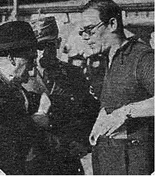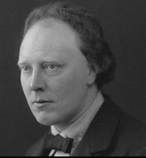 Leonard Woolf
Leonard Woolf § “The Economic Determination of Jane Austen” by Leonard Woolf (1942)
I was sure this was going to be a joke. But no, Woolf is dead serious. “The economic determination of Jane Austen is of the type which one usually associates with a capitalistic bourgeoisie.” Deliberately oblivious to the fact that an author can both love her characters and treat their aspirations with irony, as far as Leonard Woolf is concerned, Jane Austen can go fuck herself.
Woolf’s essay is just as narrow-mindedly stupid as Walter J. Turner’s screed on Bach.
 Peter Chamberlain (hatless) arguing with a German official at the 1939 International Six Days [motorcycle racing] Trials in Salnzburg
Peter Chamberlain (hatless) arguing with a German official at the 1939 International Six Days [motorcycle racing] Trials in Salnzburg § “What the Hell?” by Peter Chamberlain. (1935)
A caricature of a rich asshole.
I got some links I've never seen bettered, platinum and pearl they are, with a set of studs to match. The tops screw in. I only got two left now, a prostitute pinched one, the bitch! Not that it makes any odds 'cos my shirts, they're specially made for me, show only two studs, see?
So I like to arrange them all on the dressing-room table with my ivory hair-brushes before I go to bed.
Chamberlain lets the guy run on like this for two pages, then applies the coup de grace with the last sentence.
Yes, I’ve got pretty everything I want. Well, then? Well, then? What the sweet Hell?
Chamberlain was a member of the Birmingham Group, whose aim roughly was to produce proletarian literature – such as this piece, if you think about it.
Unlike other members of the Group, Chamberlain was upper crust and had gone to an elite public school. He redeemed himself by becoming a “notable motorcycle journalist” (Wikipedia) and the author of a novel about the motor racing set in Birmingham and the Isle of Man.
Note that Chamberlain’s capitalist ogre is nouveau riche. My guess is that, Marxist or not, Chamberlain would not have been as scathing about old money.
 Stevie Smith
Stevie Smith § “Private Views” by Stevie Smith (1938)
A review of the summer exhibition at the Royal Academy of Art.
Smith is at her most virtuosic making fun of the bourgeois (though she would never use the term – too gauche) who have come to see the pictures.
So that, sitting on this elegantly buttoned leather sofa in Room III, we know again the soft moment of excitement when the rather queer dress was taken from the wardrobe, and the queer hat was placed at an incorrect angle to the face, that is for to-day slightly made-up (this is delicious, this quite wrong, distressing, funny maquillage that makes the women look a little too bold for their candid eyes). There is one lady who has a white lace arrangement that cascades from the crown of her hat across and beyond the wide brim, falling in a soft movement of a very good lace over her left eye, so that the remaining one eye, forced into contrasting prominence to do the work for two, holds and repels enquiry from anxious friends.
About the exhibition itself, Smith is more earnestly – therefore, less convincingly – biting.
... we have no special quarrel that Matisse, Picasso, Dali, are not here; but how disappointed we may feel that among the fine soldiers on the wall there is no hint of Goya's Wellington, among the grey landscapes no thought for Corot, and among the genre pictures no rhinoceros watched by Venetian ladies. Des fesses et des tétons? [Buttocks and tits] Among the nudes there is absolutely no sense of this, therefore no sense at all.
 Clive Bell
Clive Bell § “Matisse and Picasso” by Clive Bell. (1933)
I put it forward as a hypothesis, and as nothing more, that what the journeyman, be he tinker, tailor, toy-maker or housepainter, but be he ever so little individual and an artist, is crudely and unconsciously manifesting, Picasso is trying to express deliberately, in full and perfect consciousness, and with exquisite delicacy. It is the complete consciousness that gives the touch of cynicism. He is trying to express his sense of such idiosyncrasy and oddity as has adhered, parasitewise, to our uniform and machine-ridden civilization. Matisse, meanwhile, is painting rapturously, as a bird sings, in the ageless garden of the French tradition. Probably, because he has founded no school, he will be admired by future generations — and he will be admired as long as painting is enjoyed — as the last of the great Impressionists.
“Parasitewise”? Please!
 Robert Wilson Lynd
Robert Wilson Lynd § “Light on the Bourgeoisie” by Robert Lynd. (1933)
Of course, there was a limit to how far each individual Brit would go for Marxism. For Lynd, the Russians reached that limit by arresting English gentlemen to be coerced and then convicted in the Moscow show trials, and by holding their class against them.
The English gentlemen were engineers and administrators employed by a British firm contracted to help build electric power generation plants. Russia’s great power generation project of the 1930’s was intended to prove that labor, politically inspired and unshackled from capitalism, could outdo itself in production capacity. When the construction projects ran into delays, Stalin blamed foreign saboteurs.
Lynd has a deft touch with irony. It slithers around his sentences like a snake in grass.
I hope no one will think I am defending the immorality of the rich... I am merely doing my best to point out that from the Machiavellian point of view there is something to be said for them. And in estimating their guilt it should always be remembered that many of them had not the advantage of having been brought up in an atmosphere of proletarian morality. Even one of the lawyers at the Moscow trial recognized the fact that a man who had not been brought up in true proletarian surroundings could not be expected to behave perfectly. Mac-Donald's counsel put forward the extenuating plea that the prisoner's lameness as a boy had prevented him from walking into working-class districts and so getting into touch with proletarian opinion. "Had his legs been sound," he declared, "then perhaps they would have taken him into a working-class district where he would have met with some other William of a more common type, he would have seen a corner of life different from his petty-bourgeois, middle-class, intellectual British family, an idea of which I believe you will get from Dickens's old novels, or from some other novels which depict the environment." Certainly those middle-class intellectual families which Dickens depicts — the Wellers, the Gargerys, the Sikeses, or even the Pecksniffs, the Nicklebys, or the Squeerses — were curiously walled in from proletarian truth and morality.
And:
In the courts of the future, I hope, when a man is accused of a crime, it will be enough for the prosecuting counsel to point out that his brother rented a flour-mill in order to obtain a conviction. How much time English juries would have been saved if evidence of this kind had been accepted as proof of guilt. On several occasions in recent years we have seen old public schoolboys in the dock, and, instead of pointing out that they were old public schoolboys and therefore guilty, the prosecution has called all manner of tedious evidence to prove the obvious. For my part, I should like in such cases to see the counsel for the prosecution calling no evidence at all apart from the school and university career of the accused. What speech for the prosecution could be more damning than a speech consisting of the single sentence: "Gentlemen of the jury, the prisoner is an old Etonian"?
 Dr. Harry Roberts
Dr. Harry Roberts § “The East End” by Harry Roberts. (1932)
Card-carrying approval of Volume III of The New Survey of London Life and Labour, an official Labor government publication, and card-carrying disapproval of a book entitled The Real East End “which, though full of information not to be found in any other single volume, is, for me, difficult to read with patience. It has that ‘intimate,’ patronizingly knowing quality which marks the writings of many of our bird-watching naturalists.” (Note the tentative, very British, “for me,” which would have been deleted by a Soviet censor.)
 RSS Feed
RSS Feed